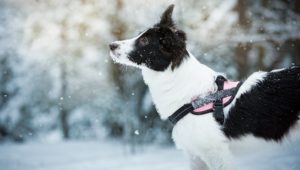 As we finish up our Thanksgiving leftovers and plunge deeper into the cold, dry months of winter, we have to remember to take extra care for our best furry friends. There are plenty of myths about dogs and their abilities to get through winter, but these myths can be misleading and dangerous. It’s important to sort out fact from fiction to make sure our dogs stay safe and healthy in winter. Here are some myths about dogs in winter and the truth about what you should do for your dog.
As we finish up our Thanksgiving leftovers and plunge deeper into the cold, dry months of winter, we have to remember to take extra care for our best furry friends. There are plenty of myths about dogs and their abilities to get through winter, but these myths can be misleading and dangerous. It’s important to sort out fact from fiction to make sure our dogs stay safe and healthy in winter. Here are some myths about dogs in winter and the truth about what you should do for your dog.Myth 1: Fur Protects All Dogs From The Cold
Not all dogs are created equal when it comes to cold weather tolerance. Obviously, a Siberian Husky is more prepared for the snow than a Chihuahua, but having a fur coat doesn’t mean a dog can’t get uncomfortably cold or suffer from hypothermia in extreme weather. You can purchase coats for dogs that are designed to fit your pup’s exact size and breed. If your dog is susceptible to the cold, layer up. Dog jackets are fairly easy to get on and off, and your dog will be safer for the extra effort.
Myth 2: Dogs Can Just Eat Snow If They’re Thirsty
Snow is great at hiding garbage, animal waste, and worst of all, salt and chemicals. Your dog could easily get sick from any of those things, so it’s not a good idea to allow your dog to eat snow, no matter how excited they are to taste magical solid water. You might think freshly fallen snow is fine, but again, there’s no telling what could be underneath the snow. Snow will also lower your dog’s core temperature, making them even colder. It’s best to stick to tap water.
Myth 3: Dogs Won’t Get As Dehydrated In Cold Weather
Speaking of water, humans tend to think dogs are more likely to get dehydrated in hot weather. This is not true. Winter brings very dry weather, and dogs lose a lot of their body moisture through their breath, especially from panting. Since you aren’t feeling the heat as much, it’s easy to forget the importance of staying hydrated. Make sure your dog gets plenty of water before and after walks.
Myth 4: Dog Waste Dissolves In The Snow
Why don’t people pick up after their dogs in winter? Maybe it’s because many people assume that the waste will just melt away with the snow. It doesn’t. In fact, cold weather slows the biodegradation process, so the mess will stay around until spring. Not only is this a gross nuisance, it’s a public health concern as it attracts rodents and bacteria. It also transmits disease from dog to dog. Be courteous. Pick up after your pup. Every time.
Myth 5: Dogs Can’t Get Fleas And Ticks In Winter
While the cold and snow tends to kill off most pests, fleas and ticks like to seek warm shelter in winter. And since your house is the warmest place around, that might be where they end up. Don’t give up on routine flea and tick inspections and medication just because you think all the bugs are dead. Excessive itching on top of already dry skin can be very harmful to a dog.
Myth 6: Dogs Don’t Need Paw Protection For Just A Short Walk
Dog boots and paw wax are such a pain to get on. Surely if you’re only going to be out for a few minutes, you can skip it, right? While dog paw pads are more resilient than human feet, they are not immune to frostbite. But perhaps even more harmful is the salt used to melt ice, as it creates a reaction that burns paws. Yes, even in the cold, your pup’s paws might get burned. Dogs also absorb antifreeze and chemicals through the pads. So use paw protection. Every time.
Myth 7: Dogs Can Remove Excess Snow From Fur By Themselves
When your pup comes in from the cold, you probably towel off the extra snow as much as you can. But you might notice some extra little bits of snow stuck in their fur. Your dog will probably try to remove these on their own, but that’s not necessarily safe. Excessive licking, chewing, and gnawing can damage skin that’s already dry due to the cold weather. Also, it’s possible that the snow on your dog’s fur can hide antifreeze or salt, which can make them very sick. Spend a little extra time getting those bits of snow out, and your pup will be much happier. And they won’t be tracking nearly as much water around the house.
